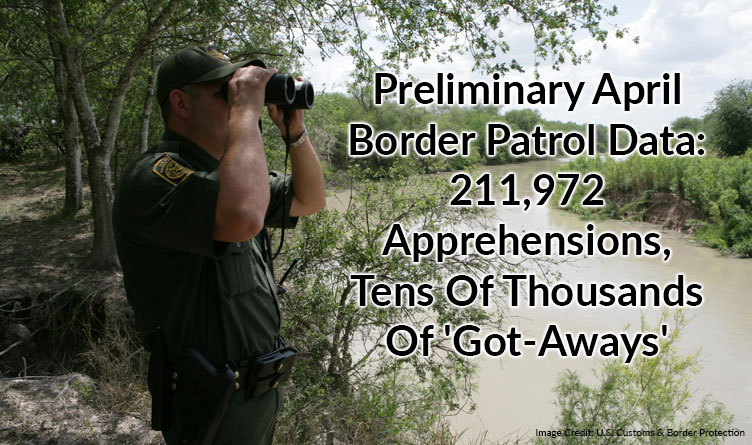Data Confirms Far More People Entering U.S. Illegally Than Reported.
Photo: U.S. Border Patrol Agent scans the area into Mexico looking for illegal immigrants potentially staging to enter the United States. Photo Credit: U.S. Customs and Border Protection
By Bethany Blankley [The Center Square contributor] –
According to preliminary U.S. Border Patrol data for the month of April, BP agents apprehended 211,972 people entering the southwestern border illegally.
The data is preliminary and excludes figures from the Office of Field Operations, which will likely make the numbers higher.
A minimum of an additional 58,000 “got-aways,” identified as known and reported to have evaded capture, also entered the U.S. illegally in April. However, this number is anticipated to be much higher, based on how data is recorded.
The Center Square obtained the information from a Border Patrol officer at the southern border in Texas. It includes got-away estimates, which aren’t normally in the monthly enforcement reports issued by U.S. Customs and Border Protection.
The BP officer, speaking on condition of anonymity for fear of retaliation, also told The Center Square that got-away numbers are being deleted from the system, or labeled as something else to make it seem like there are fewer.
The numbers are broken down by BP sector and categories, including apprehensions, turn backs, non-violations, outstanding, no-arrests, got aways (known/recorded), and deceased.
The sectors that saw the most traffic last month, as in nearly all months, were in Texas in the Del Rio and Rio Grande Valley sectors.
According to preliminary data as of May 2, from April 1-30:
The BP officer, speaking on condition of anonymity for fear of retaliation, also told The Center Square that got-away numbers are being deleted from the system, or labeled as something else to make it seem like there are fewer.
The numbers are broken down by BP sector and categories, including apprehensions, turn backs, non-violations, outstanding, no-arrests, got aways (known/recorded), and deceased.
The sectors that saw the most traffic last month, as in nearly all months, were in Texas in the Del Rio and Rio Grande Valley sectors.
***Click HERE to support Conservative Journalism in Tennessee. We can’t bring you stories like this without your support!***
According to preliminary data as of May 2, from April 1-30:
The Del Rio Sector reported:
Apprehensions: 42,564
Turn Backs: 182
Got-Aways (known/recorded): 16,341
Unresolved Detection: 163
No Arrest: 4,138
Deceased: 10
Non-violation: 229
Outstanding: 75
The Rio Grande Valley Sector reported:
Apprehensions: 42,604
Turn Backs: 4,453
Got-Aways (known/recorded): 4,071
Unresolved Detection: 242
No Arrest: 3,041
Deceased: 12
Non-violation: 383
Outstanding: 41
The El Paso Sector reported:
Apprehensions: 30,384
Turn Backs: 3,706
Got-Aways (known/recorded): 6,903
Unresolved Detection: 33
No Arrest: 290
Deceased: 0
Non-violation: 141
Outstanding: 8
The Laredo Sector reported:
Apprehensions: 13,112
Turn Backs: 2,901
Got-Aways (known/recorded): 2,209
Unresolved Detection: 15
No Arrest: 1,207
Deceased: 4
Non-violation: 290
Outstanding: 0
The San Diego Sector reported:
Apprehensions: 15,197
Turn Backs: 657
Got-Aways (known/recorded): 5,012
Unresolved Detection: 12
No Arrest: 5,256
Deceased: 0
Non-violation: 45
Outstanding: 226
The Tucson Sector reported:
Apprehensions: 26,360
Turn Backs: 1,006
Got-Aways (known/recorded): 17,708
Unresolved Detection: 1,224
No Arrest: 2,646
Deceased: 6
Non-violation: 222
Outstanding: 547
The Yuma Sector reported:
Apprehensions: 31,382
Turn Backs: 292
Got-Aways (known/recorded): 3,457
Unresolved Detection: 64
No Arrest: 54
Deceased: 5
Non-violation: 66
Outstanding: 391
The El Centro Sector reported:
Apprehensions: 6,452
Turn Backs: 595
Got-Aways (known/recorded): 842
Unresolved Detection: 5
No Arrest: 7
Deceased: 1
Non-violation: 4
Outstanding: 14
The Big Bend Sector reported:
Apprehensions: 3,917
Turn Backs: 64
Got-Aways (known/recorded): 2,042
Unresolved Detection: 201
No Arrests: 518
Deceased: 0
Non-violations: 29
Outstanding: 133
Apprehensions include those in the U.S. illegally who surrender or are caught by BP officers. Turn backs include those who entered illegally but returned to Mexico.
The categories of “no arrests” and “unresolved detection” aren’t part of 6 U.S. Code, which BP officers use to classify encounters. They are used as a way to lower the number of got-aways being reported, the BP officer says.
No arrests mean someone “was detected in a non-border zone and their presence didn’t affect Got-Away statistics,” according to the official internal tracking system used by Border Patrol. “Unresolved detection” means the same thing, but the officers, for a range of reasons, couldn’t determine citizenship.
Non-violations are “deemed to have committed no infraction and don’t affect Got-Away statistics,” according to the tracking system definition.
No arrests and non-violations can include citizens.
Outstanding includes encountered people who haven’t yet been categorized as turn backs, apprehensions or got-aways.
However, non-violations, no arrests and unresolved detection, should actually be categorized as got-aways, the BP officer says.
Because each sector determines how it categorizes data, reporting is inconsistent. For example, in the San Diego and Rio Grande Valley sectors, the BP officer says, no arrests is often used as a category to include got-aways, which is why their numbers are so high. Tucson and Del Rio sectors hold data in outstanding for 72 hours, whereas other sectors don’t, the BP officer pointed out.
A more accurate estimate of got-aways for April would include data categorized as unresolved detection, non-violation and no arrest, assuming all non-arrests were of non-citizens, the BP officer said. This would put got-aways closer to over 71,000.
However, these numbers also exclude known got-aways not recorded due to several factors and the unknown number of people who entered illegally and evaded capture.
BP officers have no way of knowing who any of the got-aways are, although they estimate many have criminal backgrounds, are likely dangerous and working with Mexican cartels.

About the Author: Bethany Blankley is a writer at the Center Square, Patheos/Hedgerow, political analyst and former press secretary at Capitol Hill / NY / WDC. Follow Bethany on Twitter @BethanyBlankley.





